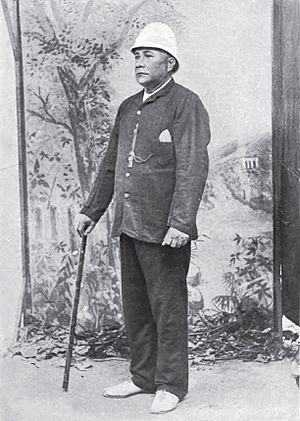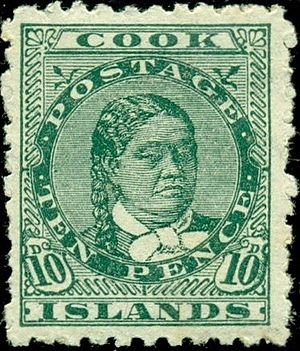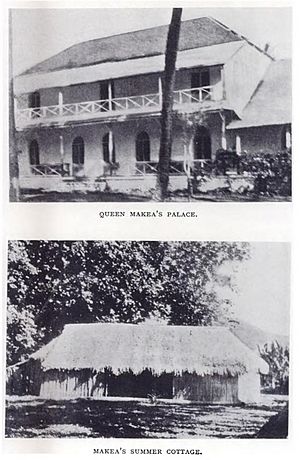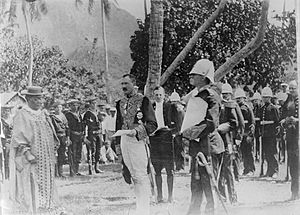Makea Takau Ariki facts for kids
Quick facts for kids Makea Takau Ariki |
|
|---|---|
| High Chiefess of Rarotonga Queen of the Cook Islands |
|
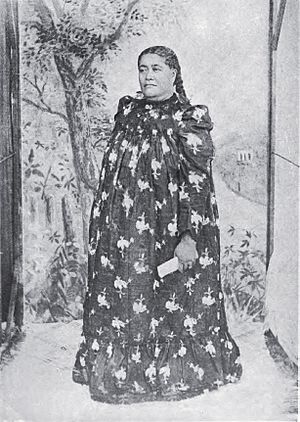
Makea Takau Ariki, Auckland visit (1885)
|
|
| Reign | 1871–1911 |
| Predecessor | Makea Apera Ariki |
| Successor | Makea Rangi Ariki |
| Born | circa 1839 Avarua, Rarotonga |
| Died | 1 May 1911 (aged 72) |
| Spouse | Ngamaru Rongotini Ariki |
| Issue | none |
| House | House of Te Au O Tonga |
| Dynasty | Makea Nui Dynasty |
| Father | Papelna (?–1901) or Tiberio, Pastor of the LMS |
| Mother | Makea Te Vaerua Ariki |
Makea Takau Ariki (1839–1911) was a very important leader of the Cook Islands. She was the ariki (queen) of the Makea Nui dynasty. This was one of the three main chiefdoms on Rarotonga island.
Her long reign lasted for forty years, from 1871 to 1911. This was a crucial time for the Cook Islands. During her rule, the Cook Islands became a British protectorate in 1888. Later, they were joined with New Zealand in 1900.
Contents
Family and Early Life
Makea Takau was adopted by her uncle, Makea Davida. Her birth mother was his sister, Makea Te Vaerua Ariki. Makea Te Vaerua Ariki was the oldest daughter of Makea Pori Ariki.
How Makea Takau Became Queen
Makea Davida was the ariki of Te Au O Tonga from 1839 to 1849. His sister, Te Vaerua, became ariki after him until 1857. Her younger brother, Makea Daniela, then ruled until 1866. Another brother, Makea Abera, took over until 1871. When Makea Abera died, Makea Takau became the new ariki.
Marriage and Personal Life
In the 1860s, Makea Takau married Ngamaru Rongotini Ariki. He was one of the three high chiefs from the island of Atiu. He was also a chief of the nearby islands of Mauke and Mitiaro. They did not have any children. Ngamaru was known for being more warlike than the queen. He passed away in 1903.
According to Beatrice Grimshaw, a journalist who visited in 1907, they had a happy marriage. She wrote that when Ngamaru died, the queen tore up her beautiful robes. She threw the pieces into his grave. This was so he would have a soft resting place, showing how much she loved him.
Makea Takau's Reign
In 1843, France took control of Tahiti and the Society Islands. This made the Cook Islands' ariki very worried. They asked Britain for protection in case of a French attack. This worry continued for many years. They asked for British protection again in 1865.
Prosperity and British Protection
During the 1870s, the Cook Islands were peaceful and prosperous under Queen Makea. She was a clever negotiator. She got good prices for the islands' exports. She also helped reduce the debts that had built up before she became queen. By 1882, four out of the five ariki on Rarotonga were women.
In 1888, Queen Makea formally asked Britain to create a Protectorate. She believed the French were about to invade. Britain was slow to act as administrators. New Zealand and European residents kept pushing Britain to hand the Cook Islands over to New Zealand.
New Zealand's Influence
The first British Resident was Frederick Moss, a New Zealand politician. He tried to help the local chiefs form a central government. In 1898, another New Zealander, Major W.E. Gudgeon, became the British Resident. His goal was to prepare the way for New Zealand to take over from Britain. This was part of New Zealand's Prime Minister, Richard Seddon's, plan to expand his country's influence.
Queen Makea did not like this idea. She preferred the Cook Islands to be joined with Britain directly. One good thing that came from the British involvement was freedom of religion. This led to new missionaries from different groups arriving. The first Roman Catholic church was built in 1896.
Annexation by New Zealand
After much discussion and political moves, the Cook Islands were formally joined with New Zealand. This happened on 7 October 1900. A document was signed by five ariki and seven lesser chiefs. This happened without much debate about what it would mean for the islands.
Para O Tane Palace
In Avarua, you can find the Para O Tane Palace and the sacred Taputapuatea marae nearby. This marae was named after a famous one in the Society Islands. Taputapuatea was once the largest and most sacred marae on Rarotonga. The palace is where Queen Makea signed the treaty on 26 October 1888. This treaty made the Cook Islands a British protectorate.
A Glimpse of the Palace
Beatrice Grimshaw described the palace during her visit in 1907:
We walked through the blazing hot sun of the tropic afternoon, down the palm-shaded main street of Avarua town, to the great grassy enclosure that surrounds the palace of the queen. One enters through a neat white gate; inside are one or two small houses, a number of palms and flowering bushes, and at the far end, a stately two-storeyed building constructed of whitewashed concrete, with big railed-in verandahs, and handsome arched windows. This is Makea's palace, but her visitors do not go there to look for her. In true South Sea Islander fashion, she keeps a house for show and one for use.
The palace was in ruins for many years and closed to the public. However, it was still officially an important center of power. In 1990, students from Auckland University and local volunteers worked together to rebuild it. Over three years, the building was restored. It now looks much like it did in its best days.
Death and Legacy
After a long illness, Queen Makea passed away at midnight on 1 May 1911. She was 72 years old. Doctor Perceval, the Chief Medical Officer, cared for her during her illness. The Resident Commissioner, Captain J. Eman Smith, visited her daily and was with her when she died.
Her body lay in state until Wednesday, May 3rd. Many residents came to see her. She was buried in the family graveyard on the Palace grounds.
Succession After Her Reign
Queen Makea chose Rangi Makea as her successor. On 24 October 1911, he was installed as Ariki. The late Queen had been the head of government. Her successor did not receive the same role, but he had equal status to the other Arikis.
 | Anna J. Cooper |
 | Mary McLeod Bethune |
 | Lillie Mae Bradford |


